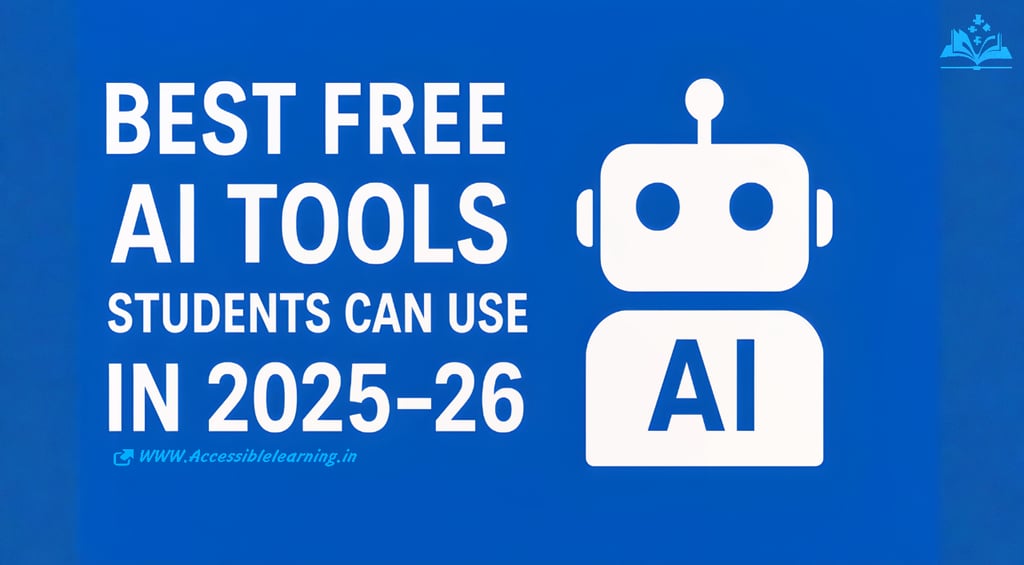
Best Free AI Tools Students Should Use in 2025–26
A complete, student-focused guide to the best free AI tools for 2025–26. This article explains how AI can help with writing, research, studying, coding, presentations, productivity, and exam preparation. It includes detailed tool breakdowns, practical examples, and tips for using AI responsibly so students can study smarter, save time, and improve academic performance without paying for expensive software.
AI/FUTUREA LEARNING
Sachin K Chaurasiya
11/22/20255 min read


AI has become one of the strongest study companions for students across schools, colleges, and professional courses. Whether you’re writing essays, preparing for exams, coding assignments, or building presentations, free AI tools can reduce workload and improve learning quality. The best part is that many top AI platforms now offer strong free versions or student-focused benefits.
This article breaks down the most useful free AI tools in 2025–26, grouped by how students actually use them, with practical examples.
Writing, Editing, and Assignment Support
Writing assignments is one of the biggest time challenges for students. These AI tools help with clarity, structure, grammar, and research.
ChatGPT Free
Even the free version provides reliable help for:
Brainstorming essay topics
Drafting outlines
Breaking down difficult concepts
Generating examples and explanations
Creating practice questions
Simplifying academic language
Extra Uses Students Love:
Turning lecture notes into clean paragraphs
Creating revision notes from textbooks
Getting step-by-step problem-solving guidance
Grammarly (Free)
A must-have tool for academic writing. It fixes:
Grammar mistakes
Spelling errors
Tone issues
Clarity problems
Bonus: Students can use it across emails, assignments, presentations, and application letters.
Hemingway Editor (Free Web App)
Perfect for making writing clean and simple.
It highlights:
Hard-to-read sentences
Complex words
Passive voice
Overuse of adverbs
Helps students write more clearly and academically.
QuillBot (Free Paraphrasing + Summaries)
Useful for rewriting your own notes and converting long text into easy-to-read summaries.
Great for:
Essay refinement
Rewording drafts
Reducing repetitive writing
Research, Summaries & Study Materials
Students often waste hours reading long documents. AI tools shorten this process.
Google NotebookLM (Free Version)
Acts like a personal study assistant.
Upload your:
PDFs
Notes
Textbooks
Lecture slides
It will create:
Clean summaries
Study notes
Sample questions
Topic-based explanations
Perplexity AI (Free Search Assistant)
One of the best research-focused AI tools.
Perplexity provides:
Verified sources
Expert-like explanations
Real-time academic references
Topic comparisons
This is extremely helpful for reports, essays, and concept understanding.
ScholarAI (Free Academic Search Plugin)
Pulls information from academic publications.
Useful for:
Literature reviews
Research papers
Thesis work
Scientific summaries
Elicit (Free Lite Mode)
Helps students find research papers using smart filtering.
Finds:
Key insights
Results
Methodologies
Abstract summaries

Note-Taking, Flashcards & Study Systems
AI can turn passive notes into active learning materials.
Notion AI (Free for Students)
Students often get upgraded features with academic email IDs.
Use it to:
Organize notes
Create revision pages
Generate summaries
Build study plans
Track assignments and deadlines
Anki + AI Add-ons
Anki is the gold standard for spaced repetition flashcards.
AI add-ons help you:
Create flashcards from PDFs
Convert lecture content
Generate Q&A sets
Build memory cycles
Perfect for medical, engineering, and competitive exam students.
Penseum (Free Tier)
Creates:
Flashcards
Quizzes
Mini exams
Study summaries
Upload videos or PDFs, and it automatically converts them into study material.
RemNote (Free Version)
A structured note-taking tool built for students.
Features include:
AI-generated flashcards
Concept linking
Knowledge maps
Coding, Debugging & STEM Assistance
Students in programming, engineering, and technical fields need AI tools that help them understand and build logic.
GitHub Copilot (Free for Students)
Through GitHub Education, students can get free access.
Helps with:
Code autocompletion
Debugging
Writing functions fast
Learning new languages
Building projects
Codeium (100% Free)
A fast and accurate AI code editor.
Features include:
Code suggestions
Error fixing
Code explanations
Multi-language support
Works as a great alternative to paid coding tools.
Replit AI (Free Tier)
A cloud-based coding environment with AI support.
Students can:
Build apps
Run code instantly
Fix bugs
Learn new programming languages
Wolfram Alpha (Free Basic)
Best for mathematics and science problem-solving.
Solves:
Algebra
Calculus
Physics equations
Logical problems
Graphing


AI Tools for Presentations, Visual Projects & Creativity
Students often need to create visual content. AI tools make the process faster and more professional.
Canva (Free with AI Features)
Great for:
Presentations
Posters
Infographics
Diagrams
Project visuals
AI features help generate layouts, designs, and visuals from simple text.
Gamma AI (Free Credits)
Turns plain text into attractive presentations.
Perfect for:
Group projects
Class presentations
Portfolio slides
Clipchamp (Free AI Video Tools)
Microsoft’s editing platform helps students produce simple videos.
Useful for:
Video assignments
Project demos
Social media content
Kapwing (Free with Watermark)
An easy video and image editor with AI-powered:
Transcriptions
Subtitles
Text-to-video
Montage creation
Accessibility, Audio & Productivity Tools
Every student learns differently. AI can support different learning styles.
Speechify (Free Tier)
Converts text into natural-sounding audio.
Best for:
Long PDFs
Listening instead of reading
Visual impairment support
Revision while walking
Otter.ai (Free Notes)
AI-based transcription tool.
Useful for:
Recording lectures
Meeting notes
Seminar summaries
Google Lens + AI Search
Helps students:
Solve math problems
Translate text
Identify objects
Extract text from images
Forest + AI Productivity Apps
Forest helps you focus.
Combine it with AI reminders and calendars to:
Manage time
Avoid distractions
Plan study sessions
Best Practices for Students Using AI
To use AI responsibly and effectively:
Always verify facts and citations
Add your own voice to assignments
Use AI to understand, not cheat
Follow your school’s AI usage guidelines
Treat AI-generated notes as support material
Keep privacy in mind when uploading files
AI tools can make studying easier, faster, and more enjoyable. Whether you’re a school student, college learner, or preparing for competitive exams, free AI tools in 2025–26 offer everything you need to write better, learn faster, and stay organized.

FAQ’s
Q: Are these AI tools really free for students?
Yes, most tools listed have free versions. Some offer additional free benefits for students with an academic email (for example, GitHub Copilot Student, Notion Student, and Google educational offers). Always check eligibility or region-based availability.
Q: Can I use AI for assignments without getting into trouble?
Yes, but only if you use it responsibly.
You should:
Use AI for research, brainstorming, and explanations
Write your own final work
Check your school’s AI policy
Avoid submitting AI-generated text as your own
Responsible use is completely acceptable in most institutions.
Q: Which AI tool is best for writing essays?
For writing and polishing essays:
ChatGPT (for explanations and outlines)
Grammarly (for grammar and clarity)
QuillBot (for paraphrasing)
Hemingway (for readability)
Using these together gives the best results.
Q: What is the best free AI tool for research?
Perplexity AI is the strongest for research because it provides sources and citations.
NotebookLM is also excellent for creating summaries from your uploaded study materials.
Q: Which AI tool is most useful for coding students?
GitHub Copilot is the best if you have student eligibility. Otherwise, Codeium and Replit AI provide strong free support for coding, debugging, and learning.
Q: Can AI help me prepare for exams?
Yes. Many tools help with revision:
Anki + AI add-ons (flashcards)
Penseum (auto-generated quizzes)
Notion AI (study plans and summaries)
NotebookLM (chapter explanations)
They simplify concepts and improve long-term memory.
Q: Which AI tool is best for making presentations?
Canva and Gamma AI are the most student-friendly. Gamma turns text into slides automatically, while Canva gives more design control for academic presentations.
Q: Do AI tools work offline?
Most AI tools require an internet connection because they depend on cloud models. However, tools like Anki flashcards can be used offline after syncing.
Q: How can I avoid plagiarism when using AI?
Never paste AI-generated text directly into your submission
Rewrite ideas in your own language
Verify facts and sources
Use plagiarism checkers
Follow your school’s rules
AI should guide your thinking, not replace it.
Q: Which free AI tools are best for note-taking?
Notion (free for students), RemNote, and NotebookLM are ideal. They organize notes, generate summaries, and convert messy study material into clean formats.
Q: Is AI safe for students to use?
Yes, as long as you:
Don’t upload sensitive documents
Check privacy settings
Use trusted tools from reputable platforms
Always be careful with personal data and exam material.
Q: Can these AI tools help with competitive exams?
Absolutely.
Students preparing for NEET, JEE, UPSC, SSC, or international exams can use:
Anki for memorization
NotebookLM for chapter breakdowns
ChatGPT for conceptual clarity
Perplexity for research topics
AI won’t replace hard work, but it makes learning more efficient.
Subscribe To Our Newsletter
All © Copyright reserved by Accessible-Learning Hub
| Terms & Conditions
Knowledge is power. Learn with Us. 📚


